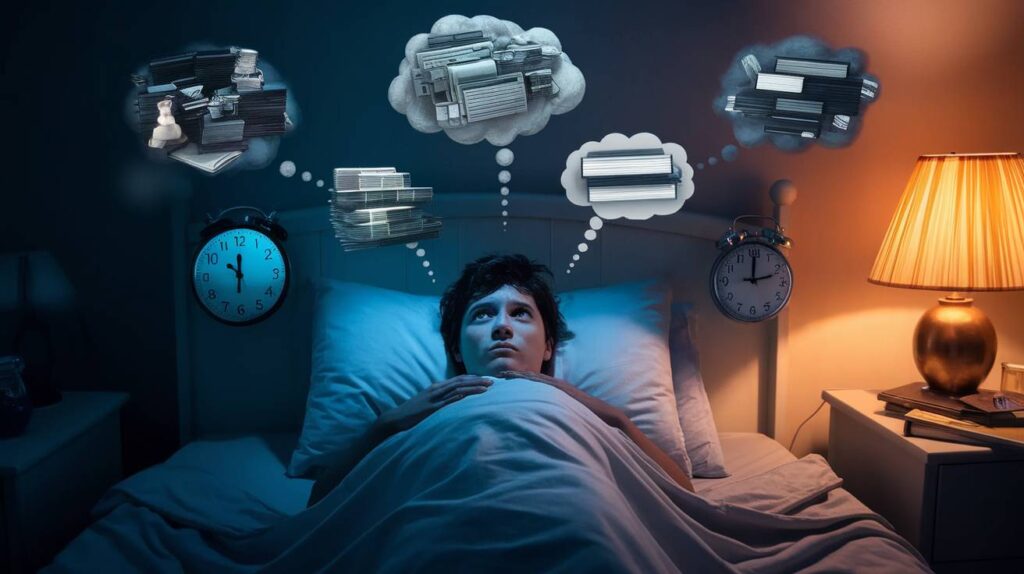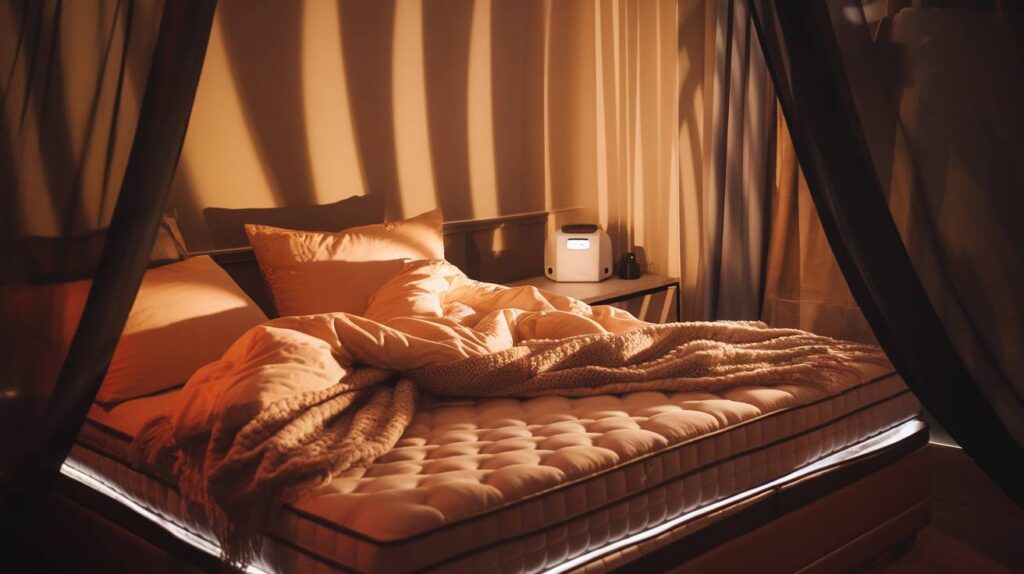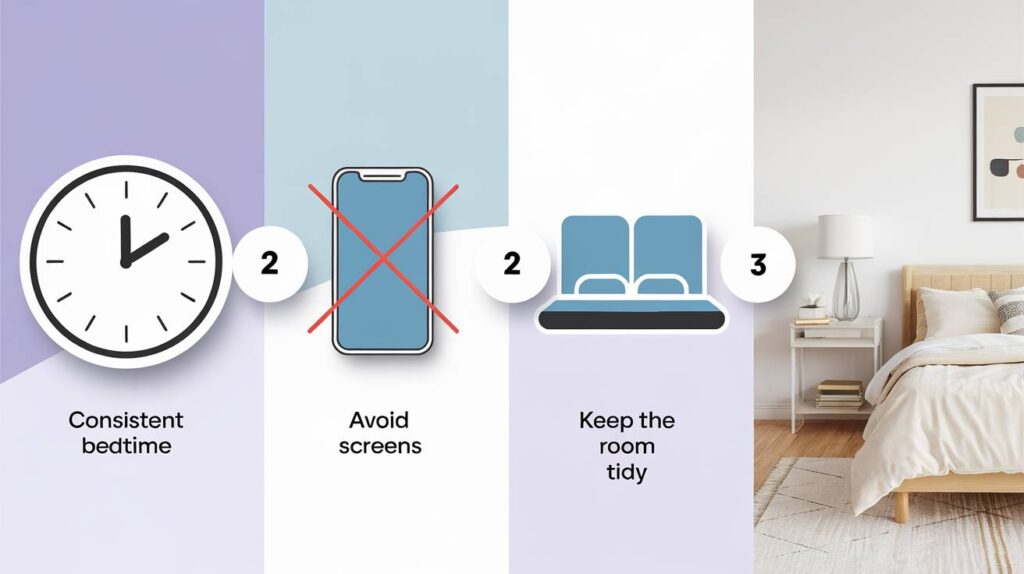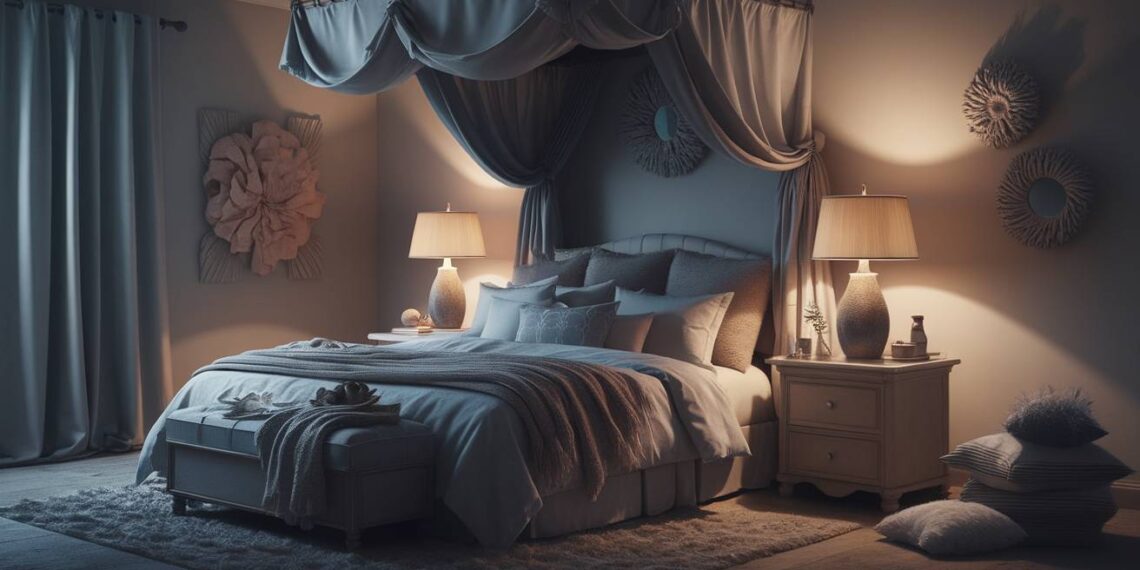Ever felt trapped in a vicious cycle of stress and sleepless nights? In this deep dive into mastering stress management, discover how everyday pressures can sabotage your sleep and ways to counteract it. From understanding stress’s disruptive impact to adopting proven remedies like mindfulness, physical activity, and a sleep-friendly environment, this guide redefines relaxation. We unravel the science behind stress-induced sleep troubles while showcasing practical tips to reclaim peaceful nights. Explore how managing personal and external stressors can transform your sleep quality and overall health, paving the way for enduring balance and renewed energy for a refreshed new start tonight.
Key Takeaways
- Stress dramatically disrupts quality sleep.
- Recognizing both personal and external stress triggers is essential.
- Incorporating mindfulness, exercise, and relaxation techniques can enhance sleep.
- Optimizing the bedroom environment supports natural sleep cycles.
- Seeking professional guidance can amplify the benefits of stress management.
Understanding the Impact of Stress on Sleep
How Stress Affects Sleep
Stress sure knows how to mess up a good night’s sleep, doesn’t it? When life’s pressures start piling up, your body’s cortisol levels go up too, making it harder to drift off into dreamland. Many folks find themselves tossing and turning, waking up at odd hours, or rising too early, all because stress sneaks in and disrupts their sleep. Less sleep means dragging through the day, making stress even worse. It’s like a bad domino effect.
“Stress is not what happens to us, but our response to it.”
Here’s some havoc stress can wreak on sleep:
- Heart Pounding Like a Drum: Ever tried to chill with your heart racing? Not easy.
- Tight as a Drum Skin: Stress equals tension, leaving muscles so wired you can’t relax.
- Brain Refusing to Shut Up: Too much stress can send your mind into overdrive at night.
We’ve got a piece on sleep mental health that dives deeper into how sleep and stress tag-team to affect your well-being.

The Importance of Managing Stress for Quality Sleep
Keeping stress in check is a recipe for good sleep, and everyone knows sleep is the best medicine. It sharpens the brain, keeps you emotionally balanced, and helps your body stay in top shape. Here’s why dodging stress pays off in the sleep department:
| Benefit | Why It Matters |
|---|---|
| Better Sleep Like a Baby | Letting go of stress can help you fall asleep quicker and enjoy those sweet, uninterrupted Z’s. |
| Razor-Sharp Focus | More sleep means better brain power for the next day. |
| Chill Mood on Lock | Good sleep balances your mood and wards off crankiness and gloomy days. |
| Body in Tip-Top Shape | Rested folks have stronger immunity, healthier hearts, and can keep the weight off more easily. |
| Stress Takes a Hike | Catching enough Z’s can seriously lower stress and anxiety levels. |
If you want to crash into dreamland smoothly, try taking time to chill out. Mindfulness, relaxation workouts, and breaking a sweat can all do wonders for your sleep. Check out our meditation for sleep and exercise and sleep articles for more chill-out tips.
“The greatest weapon against stress is our ability to choose one thought over another.” – William James
Understanding how stress blows up your sleep and learning how to relax better means more restful nights and healthier days. If you’re keen on some natural ways to boost your sleep, don’t miss our natural sleep aids piece.
Identifying Stress Triggers
Figuring out what gets us all wound up can seriously help in dealing with stress. And hey, who doesn’t want to sleep like a baby? Pinpointing both your own personal worries and outside stuff bugging you is step numero uno in getting a good night’s rest.
Recognizing Personal Stressors
Everybody’s got their own personal stress storm—they’re like snowflakes or bad decisions, unique to each of us. These little annoyances can mess up your sleep big time. It’s all about taking a good, hard look in the mirror to figure out what’s keeping you up at night, sweating and overthinking.
| Common Personal Stressors | Impact on Sleep |
|---|---|
| The Almighty Dollar Struggle | Say hello to insomnia and tossing ‘n turning |
| Health Woes | Anxiety over health can really crash your Z’s |
| Love Life Drama | Stress hormones crank up, sleep quality goes down the drain |
| Job Drama | Can’t seem to snooze right or stay asleep |
| Does Anyone Like Me? | Overthinking can become your new nighttime hobby |
Getting a grip on these personal triggers means you’re halfway to cooking up ways to chill out, making sleep feel a lot less like a mythical creature. Dig deeper into ways to handle personal stress in our article on meditation for sleep.
Common External Stressors
Some stressors are like bad hair days—out of your control, but they mess with your mojo anyhow. External stressors are the culprits when it comes to spiking stress and messing with sleep. But hey, pinpoint them and you can start building your own sleep-fortress.
| Common External Stressors | Impact on Sleep |
|---|---|
| Sirens and Snoring Neighbors | Can wake you up faster than a fire alarm, busting up your rest |
| Endless Work Pile | Deadlines breathing down your neck make dreams take a backseat |
| Gotta Do It all Socially | With everything you’re doing, rest wasn’t even invited |
| Breaking News Blues | World news freakouts mean sleep schedules are outta whack |
| Home Sweet Home Changes | Moves and DIY projects mean new bedtime mess-ups |
Handling these external stress bombs might mean shaking up your lifestyle or rearranging your physical space to find some peace. Take a peek at our bedroom optimization for sleep article for practical advice.
Nailing down both personal and outside stress points puts you in the driver’s seat towards managing them right, making quality sleep your new best friend. For more savvy tips, swing by our article on exercise and sleep to crank your sleep up a notch.
Effective Stress Management Techniques
To catch some quality Zzz’s, you’ve got to keep the stress monster at bay. Let’s chat about some snooze-friendly stress-busters.

Relaxation Tricks
Chillin’ out is the name of the game for kicking stress to the curb and snagging better sleep. Wanna try deep breathing, muscle mellowing, or daydreaming with purpose? They’re sweet for winding down your brain and untangling your muscles, setting you up for dreamland.
| Technique | Steps |
|---|---|
| Deep Breathing | Breathe in through your nose like you’re smelling cookies, hold it a bit, then whoosh out through your mouth. Repeat a bunch. |
| Progressive Muscle Relaxation | Squeeze, then relax. Start from your toes and work your way up to your noggin. |
| Guided Imagery | Picture walking through a quiet forest or basking on a beach. Dive into the details till it feels real. |
Want more sleep tricks? Swing over to our sleep hygiene guide.
Mindfulness and Meditation
These aren’t just some fancy words your yoga teacher throws around. Seriously, staying chill helps squash anxiety. Mindfulness keeps you in the now-juggling thoughts become less of a circus. Meditation? It’s like hitting mute on life’s noise.
| Benefit | Description |
|---|---|
| Less Anxiety | Being ‘mindful’ is like Batman against racing thoughts that stop you from snoozing. |
| Better Mental Mojo | Meditation’s all about peace and quiet upstairs. Happy mind equals happy dreams. |
| Higher Quality Sleep | Make meditation your new jam and watch sleep become the best movie you’ve ever dreamed up. |
For deeper dives on dozing off with mindful ease, peep our meditation article.
Move Your Body
Stomp out stress and snooze smoother with some good ol’ exercise. Got jittery energy? Burn it off with a workout. Bonus: your body releases endorphins, those nifty mood-boosters.
| Type of Exercise | How Often | Perks |
|---|---|---|
| Cardio (like jogging or splashing around) | 3-4 times a week | Keeps your ticker happy and tames those anxious jitters. |
| Lifting Weights | 2-3 times a week | You’ll be buff and stress will be stuffed. |
| Stretchy Stuff (like yoga) | Daily if you can swing it | Flex, feel Zen. Less tight, more sleep tight. Check out yoga ideas for more moves. |
Find your groove and plan workouts like Goldilocks—not too late or too near bedtime—and you’ll snooze just right. Want the scoop on working out and winding down? Click into the exercise and sleep handshake.
Stash these stress-solving methods in your daily mix, and you’ll soon be snoozing like a champ. For tips on turning your bedroom into a dream haven, visit our sleep and wellness guide.
Creating a Sleep-Enhancing Environment
Want to snooze like a pro? Let’s get your bedroom prepped, bedtime routine set, and screen time cut down, so you can hit that dreamland jackpot.

Optimizing Your Bedroom
Your sleeping space should be your sleep paradise. Here’s how you can turn it into the ultimate chill zone:
- Darkness: Got curtains? Blackout ones are your best buddies for that pitch-black vibe.
- Quietness: Either shush the noise with earplugs or let a white noise machine hum you to sleep.
- Cool Temperature: Crank down the temp between 60-67°F (15-19°C) for that perfect snooze.
- Comfortable Bedding: Spoil yourself with a mattress and pillows that feel like clouds.
Need more tips on making your space cozy for sleep? Check out our article on bedroom optimization for sleep.
| Factor | Ideal Condition |
|---|---|
| Noise Level | Quiet or White Noise |
| Light Exposure | Pitch Black |
| Temperature | 60-67°F (15-19°C) |
| Mattress | Comfortable, Supportive |
Establishing a Bedtime Routine
Getting into a routine can be like whispering a lullaby to your brain. Here’s the plan:
- Set a Consistent Sleep Schedule: Stick to the same sleep-wake schedule every day, even if it’s tempting to hit the snooze button on weekends.
- Relaxing Activities: Unwind with some reading, chillax in a warm bath, or get your zen on with meditation for sleep.
- Avoid Stimulants: Keep caffeine and heavy meals far from bedtime. No midnight coffee runs, sorry!
For more tricks to ease into dreamland, swing by our article on sleep routine.
Limiting Screen Time Before Bed
Those phones and tablets are sneaky sleep robbers, thanks to the blue light they spew. Here’s what to do:
- Turn Off Devices: Put all gizmos to bed at least an hour before you do.
- Use Night Mode: If you need your screen, at least switch on night mode or blue light filters.
- Engage in Screen-Free Activities: Swap scrolling for jotting in a journal, diving into a real book, or trying some gentle yoga for sleep.
These tactics will help keep your body clock on track. Find more sleep-saving tips in our article on sleep hygiene.
Developing Healthy Sleep Habits
Establishing good sleep habits is crucial for getting quality rest and keeping stress in check. Here’s a cheat sheet for snagging that peaceful night’s slumber:

Consistent Sleep Schedule
Getting your body’s internal clock in sync takes a routine. Going to bed and waking up at the same time every day, even on those tempting lazy Sundays, helps your body trip into rhythm. Deviating too much can cause wild sleep glitches and diminish your rest.
| Sleep Schedule | Benefit |
|---|---|
| 7-8 hours per night | Hooray for better mood and sharp thinking! |
| Consistent bedtime | Better Zzz’s for better nights |
| Regular wake time | Bounce out of bed with more energy! |
Find out how to fine-tune your own sleep routine.
Balanced Diet and Hydration
What’s on your plate by day matters as much as what’s on your pillow by night. A well-rounded diet bursting with nutrients keeps your body humming and helps you rest soundly. Staying hydrated is also key—just ease up on those fun drinks when bedtime looms to sidestep sleepy sprints to the bathroom.
Foods to Promote Sleep
- Complex carbs (hello, whole grains)
- Lean proteins (chicken, fish, you name it)
- Produce packed with vitamins and minerals
Hydration Tips
- Guzzle water like a champ during daylight
- Keep the chugging lighter before lights out
Check out how munchies can mess with your snooze in our diet and sleep article.
Managing Caffeine and Alcohol
Overflowing coffee cups and happy hour cheers can sabotage a good night if not handled right. Caffeine keeps you wired if you sip too late, and though alcohol might sneak a sleepy spell your way, it can muddle deep sleep and wake you up at night.
| Substance | Impact on Sleep | Recommended Limit |
|---|---|---|
| Caffeine | Keeps you up and meddles with sleep | Stop it after 2 PM |
| Alcohol | Shakes up sleep cycles, makes you wake | Stick to one drink in the evening |
Getting a grip on your caffeine and alcohol habits helps keep sleep fruitful. For more pointers, head over to our sleep hygiene tips.
By sliding these sleep-friendly habits into your routine, you’ll be sleeping like a log and stress-busting like a champ. If you’re thirsty for more wisdom on sleep and well-being, peek at our guides on sleep mental health, and stress management for sleep.
Getting Extra Help
When stress and sleepless nights become your best mates, getting some backup might just be the winning ticket. Chatting with healthcare pros or diving into therapy are spot-on moves to tackle these bumps on the road.
Chatting with Health Experts
A good convo with health experts could be the game-changer for handling stress and snoozing right. They’re pros at cracking the code on your sleep habits and stress vibes, and digging up any sneaky medical culprits messing with your rest.
They might recommend:
- Sleep Studies: Peeking into your sleep habits.
- Medical Check-Ups: Checking for troublemakers like sleep apnea.
- Tinkering with Meds: Offering advice on sleep medication.
| Health Service | What’s in it for you? |
|---|---|
| Sleep Studies | Get the lowdown on your sleep style |
| Medical Check-Ups | Unmask hidden health villains |
| Meds Advice | Custom tips on sleep meds |
Want to know how catching some z’s boosts your whole vibe? Hop over to our article on sleep and feeling awesome.
Digging into Therapy and Counseling
Therapy and counseling bring up some cool tricks for juggling stress and upping your snooze game. Stuff like CBT is tailor-made to kick out those pesky thoughts keeping you up.
Here’s the scoop:
- Cognitive Behavioral Therapy for Insomnia (CBT-I): Fixes funky sleep thinking patterns.
- Mindfulness-Based Stress Reduction (MBSR): Brings a chill vibe with mindfulness.
- Learning and Coping: Shares the know-how on beating stress and sleep troubles.
| Therapy Sorta Thing | What It Does |
|---|---|
| CBT-I | Kicks bad sleep habits to the curb |
| MBSR | Mindfulness mojo for stress |
| Learning & Coping | Handy tips on handling stress |
Curious about how mindfulness could help your shut-eye? Check out our handy guide on chilling with meditation.
Mixing expert help with stuff like turning your room into a sleep haven and sprucing up your sleep routine can really make a difference. For tips on crafting that perfect sleepy-time zone, dive into our article on bedroom magic for better sleep.
Main Tips
- Establish a consistent sleep routine.
- Practice daily mindfulness and relaxation exercises.
- Optimize your bedroom with ideal temperature, darkness, and noise reduction.
- Engage in regular physical activity.
- Reduce screen time before bed.
FAQs
How does stress impact my sleep?
Stress increases cortisol levels, leading to difficulty falling asleep, frequent awakenings, and reduced deep sleep cycles.
What are some effective stress management techniques?
Techniques include mindfulness meditation, deep breathing exercises, progressive muscle relaxation, guided imagery, and consistent physical activity.
How can I optimize my bedroom for better sleep?
Enhance your sleep space with blackout curtains, a comfortable mattress, a cool room temperature (60-67°F), and minimal noise with white noise machines or earplugs.
Resources
| Resource | Link |
|---|---|
| Sleep Foundation | https://www.sleepfoundation.org |
| National Sleep Foundation | https://www.nationalsleepfoundation.org |
| American Psychological Association | https://www.apa.org |
Recommended Products
| Product | Description |
|---|---|
| Blackout Curtains | Improves sleep quality by blocking disruptive light. |
| White Noise Machine | Masks unwanted sounds for a smoother sleep experience. |
| Memory Foam Mattress | Provides optimal support and comfort for uninterrupted sleep. |
| Aromatherapy Diffuser | Enhances relaxation with calming essential oil aromas. |
| Premium Sleep Mask | Blocks out light to help achieve deeper, more restorative sleep. |
Final Thoughts
In conclusion, the intertwined relationship between stress and sleep is undeniable, yet manageable. Mastering stress management for quality sleep involves understanding the multifaceted nature of stress—from racing hearts and tense muscles to overactive minds—and implementing a range of strategies that address both mental and physical well-being. By adopting practices like deep breathing, guided imagery, mindfulness meditation, and regular physical exercise, you are equipping yourself with the tools to create a sleep-friendly environment. Optimizing your bedroom, maintaining a consistent sleep schedule, and even seeking professional advice when needed ensures that you build a robust framework for rest. As you integrate these practices into your daily routine, not only will you experience improved sleep quality, but you will also notice enhanced focus, a more balanced mood, and a resilient body. Embrace these steps as a journey toward a life where peaceful nights become the norm, empowering you to live more fully each day.








